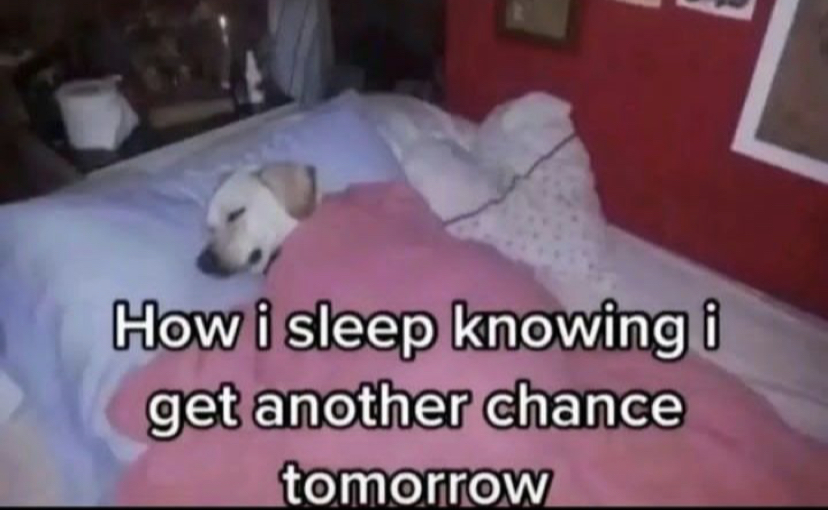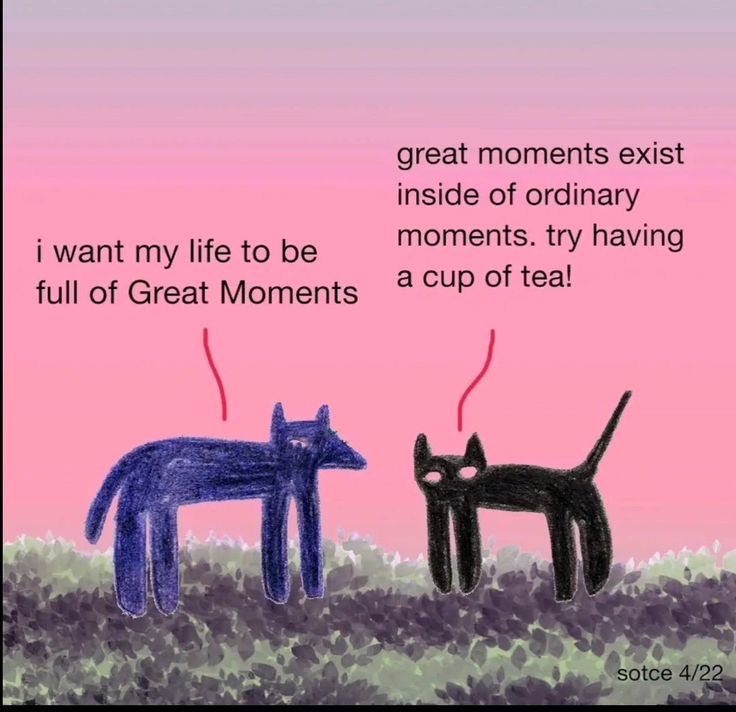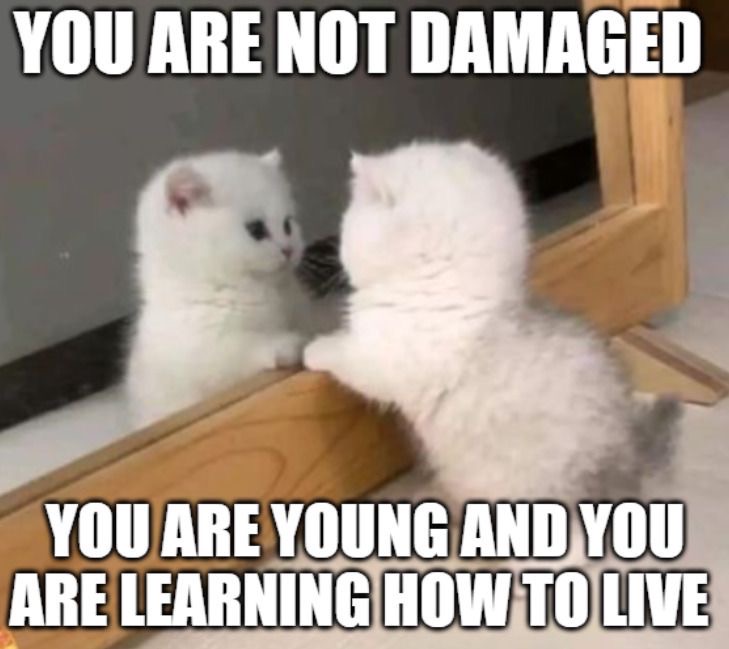When we’re sad, we usually tend to do things that’ll either distract us from this sadness or things that resonate with the feeling, which eventually make it grow even bigger. The best example for this would be listening to sad songs that relate to your current situation or emotions you’re feeling. While it may be comforting at first and make you feel understood, giving you an outlet to express and feel your emotions and validating them, it may not be the healthiest coping mechanism in the long run. Music has a significant effect on our mood. If the same type of sad music is all you listen to, it may become a justification to feel sad over time, and trigger similar emotions even when you thought you were feeling fine.
In my opinion, a similar phenomenon occurs in the digital age with the content we consume. More specifically, with memes or other pictures and videos that resonate with what you’re feeling. Social media platforms offer a space for people to share their thoughts and feelings, and many people who struggle with mental health disorders use it as an outlet to express themselves. Even if you aren’t sharing anything yourself, you can easily like, repost or engage with the content you find relatable which will make the algorithm show you similar posts you may be interested in.
Nowadays, memes have become one of the most popular forms of communication used on the internet, and you can find them about pretty much anything. The self-deprecating style of memes that find humor in depression and self loathing have been popular for a while and passed on in similar formats, with slight changes in style or text. The reason why memes are popular in general are because they evoke emotional resonance, people like and share memes owing to their emotional engagement with them.1 These type of negative, depressing memes are popular for the exact same reason, they offer emotional resonance and make people feel seen and understood, while also being humorous. However, as mentioned earlier, the more you engage with this type of content the more the algorithm throws it at you. Soon enough, your entire timeline is full with the same style of depressive memes about suicide, isolation and hopelessness. It’s all you feel, think about, and all you see.
When I was struggling really badly with my depression, I did find humor and slight comfort in these type of memes, and kept liking and reposting them. When you’re in that state, you don’t really care about the things that make you feel even worse. So what, it’s not like I cared about wanting to feel better. It’s not like I wanted to feel better. I was in complete acceptance that I was just doomed to suffer, so the content I engaged with didn’t make a difference to me. It’s a coping mechanism, and it helps me cope.
Looking back, I realize that none of it really helped me at all. It did maybe help me cope at times, but consuming depressive content and sharing relatable memes all day about how much I hated myself was probably not the healthiest way to deal with it. Everything we see affects our mood, even if we aren’t consciously aware of it. The more I found myself resonating with this type of content, the more my brain started accepting that I was nothing more than a depressed person, as if that was all that made up my identity.
In contrast to these self-deprecative, depressive memes, a genre of memes that has also been getting popular on the internet recently is “Hopecore”. Hopecore memes are characterized by their positive messages, often featuring images of dreamy aesthetics or cute animals with captions that convey a message of hope, positivity, and inspiration.2 I never came across any content that way before, and even when I did, I never really took it seriously. Now, my feed shows me more of them on a daily basis, and I do often find myself getting really emotional when it really resonates with me or my current situation. It’s just a short post or a meme made by a random stranger on the internet, but it makes me feel better for that split second, sometimes even gives me a new perspective.



Obviously, I am not trying to say that your mental health struggles depend entirely on the content you see and consume on the internet, but I do believe that it has an impact on your mood and emotional well-being more than you think it does. The positivity of hopecore, even if it’s just for a little moment, helps users reconnect with the brighter side of the internet and make them feel better. Even things that seem as simple as memes can be a lot more powerful and inspiring than we’d imagine.



I agree that the things we consume have a massive effect on how we feel and how we think, and I think that memes and other online content have much more power than people generally acknowledge. Our consumption of these things is something that should be so easy to control as well (just Don’t Look at the Negative Thing), but sometimes it’s hard to stop with these behaviours. It takes real effort to change the way you interact with memes and which ones you choose to pay attention to.
I definitely agree, it looks as if it should be really easy, but it’s a lot harder than it looks like. You have to be aware and conscious of what you’re seeing, which is almost impossible as we generally tend to turn off our brains in a sense, as we scroll aimlessly. The first step to change this consumption would be acknowledgment, but it does take real effort after that.
I loved your blog post! It reminds me of a blog post I saw years ago, but may pop up frequently since it’s quite famous. The post divided what people normally believe a diet is: what you eat and how much you eat
and what a diet really is: the people you spend your life with, your job, your eating habits, your movement, what you read, what you listen to etc.
The post wanted to highlight that our daily well-being is shaped by numerous factors, most of which we can decide whether or not they are positively resonating with us
I also think these memes can be toxic because they often downplay serious issues. While they might seem fun and comforting at first, they tend to make the underlying problems feel smaller and more trivial, as if they’re something to laugh off rather than truly address. The repetitive nature of these depressive and self-deprecating memes can reinforce feelings of hopelessness, rather than providing a healthy outlet for processing emotions. The algorithm’s focus on these posts can make it difficult to escape this cycle, leaving us feeling isolated and misunderstood. It’s important to seek out more balanced and positive content that acknowledges our struggles without minimizing their significance.
I really like this blog post, it is pertinant and a nice read. I think this experience is very common to many of us, that of being full of these “sad” memes. I remember when I was 13 and first started to encounter content like this. Like you mentioned, it can be a bit nice to not feel alone. But at the end of the day, just seeing others drown in the very same sadness that you are in is simply not healthy. I would agree with you take on them being more negative than positive, on the effect it can have on people that are already struggling. It is why I quite like these “hopecore” memes. Although they are of course not the sole tool to better mental health, it certainly helps a bit to be reminded that all will be good. I’m thinking from the perspective of the creators of these memes too, making more positive content might help them instead of feeling like they must use their struggles to put on their pages.
It is really true! The algorithm keeps showing you the same kind of content that can make you really question yourself. I had the same happen to me when I had a difficult time with my boyfriend. My Tiktoks where only about reasons to breakup and even about cheating. This really made me question my relationship and more importantly myself. Even when my relationship is going great I see those kind of content pope up and it’s really annoying.
However it is really easy to change the algorithm and focus on more positive content. My tip is just to reduce your screentime and find other hobbies such as reading books or writing in a journal.